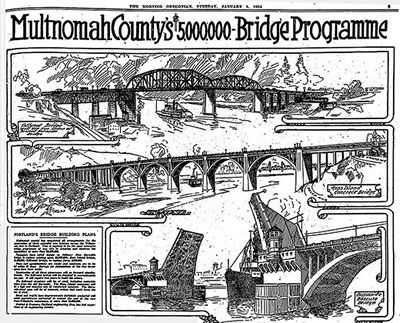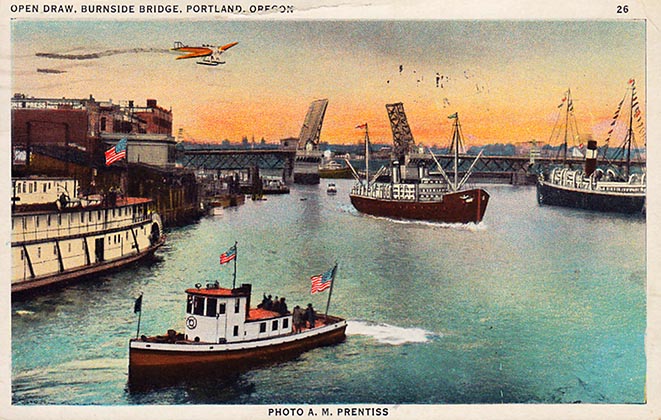PORTLAND, MULTNOMAH COUNTY; 1920s:
Bridge-building scandal aroused Portlanders’ fury
Audio version: Download MP3 or use controls below:
|

By now aroused to full suspiciousness, the public couldn’t help but wonder if they might have had more bids to work with if they’d left the bidding process open for more than one day. The Commission also tried to explain away the half-million-dollar difference in bid prices by claiming the package-deal contractors were expecting to build the Ross Island Bridge at a loss, and the inflated bid for the Burnside span was supposed to cover that loss. This explanation sounded just as implausible then as it does today. In any case, Chairman Charles Rudeen asserted earnestly, “as all the facts regarding the contracts become known we are confident it will be seen that we acted wisely and that the people of the county will approve our action.” Unfortunately for Rudeen and his fellows, the facts that soon became known were not the ones the commissioners had in mind. One of the first of these was the fact that five days before the bridge placement plans were announced, Rudeen and fellow commissioner Dow Walker had bought options on 18 residential lots right next to what they — but nobody else — knew would soon be the west end of the Sellwood Bridge. Another tidbit that soon became known — it can’t be called a fact, but it was a widely believed rumor and was most likely true — was that all the insurance needs of the package-deal contractors were being handled by Commissioner Walker’s insurance agency. By April 9, a recall petition was making the rounds. It took just two weeks to swell to over 26,000 signatures, which was an astonishingly big slice of an electorate that numbered under 70,000 at the time. This meant all three commissioners would face a recall election the very next month. And that wasn’t all they faced, either. State Attorney General Isaac Van Winkle launched an investigation on April 13 and convened a grand jury, which eventually indicted Walker and Rudeen on charges of soliciting and accepting bribes, and accused all three of them of malfeasance for not accepting the lowest bid on the Burnside Bridge. The criminal charges didn’t stick; all the commissioners went free for lack of hard evidence. But the recall election was another matter. Rudeen and Walker were turned out of office by an 85-percent majority of voters, and the third commissioner lost to a 65-percent majority. It was the fastest, most thorough and most emphatic “housecleaning” in Multnomah County history — before or since. It’s also worth noting that this recall was a big setback to the Ku Klux Klan, which had energetically backed two of the commissioners in the 1922 election. The Klan was a strong and growing force in Oregon politics at the time, but after the events of April Fools Day 1924, the “Invisible Empire” lost most Portland voters for good. But that’s a story for another day.
|
©2008-2014 by Finn J.D. John. Copyright assertion does not apply to assets that are in the public domain or are used by permission.


























